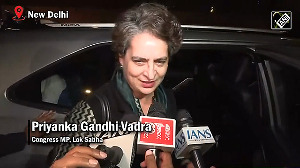So who will win the general election that could be held anytime between now and October 2004, when they actually fall due?
After sledging a bit here and there, facing off in sundry assembly elections etc, the two main political formations -- the National Democratic Alliance and the Congress party -- have got down to some serious pre-match preparations.
The Congress has sprung a surprise -- thanks to the bloody nose it got in the last general election when it went alone -- by deciding to look for ideal-minded political partners. Surprise, yes, but no dice, since the prime ministership itself, assuming a victory for it, is out of the discussion. It may not bother a man like Mulayam Singh Yadav too much, but the many others who have a problem seeing her ruling the country may not still come around. And, what's more, decide to spoil her party.
The BJP/NDA, on the other hand, is likely to enter the contest with more or less the same playing XI who took to the field last time. An Ajit Singh's exit, say, will be more than compensated by others -- for the ruling party, unlike the Opposition, seldom lacks in bench strength.
What it usually lacks, by the time elections are called, is a viable issue to take to the electorate. It's educative to recall that the last time the incumbent government won a re-election after five years of governance was in 1984. The BJP, thus, has to not only fight its opponents but also history. A double whammy is that only a Congress government has so far won a normal-timed re-election. It may take heart from the fact that it leads the first non-Congress government to have completed five years in office, but the bigger challenge lies in getting a fresh mandate when it is due.
And, by all likelihood, a year ahead of the actual tryst with the ballot, it is the NDA that seems more battle-ready, more sure of itself, and moving with an eye on the inevitable political battle. It could also be that it seems so in comparison with its main rival, the Congress party, which had redefined the term 'comatose.' After all, a large part of the positives favouring the BJP are nothing but the Congress's own negatives.
But the BJP has bucked one important trend that has been the bane of previous governments. A political thumb of rule is that the electorate's honeymoon lasts roughly 2 to 3 years, and the last phase of governance is usually spent in warding off the inevitable. Four years on, there is still no evidence of any mass sentiment against this government. Its induction was not surrounded by undue hype, so this has been a government of placidness.
Are governments voted on the basis of their achievements? Perceptions? Or both? Likewise, is the Opposition voted on the basis of a perception of what it can do, or the government's lack of achievement? Or both?
The government's performance becomes an issue when a wide spectrum of the population is affected by its policy -- like it happened in 1977. Or in 1980 when the price of onions became a metaphor for misgovernance. Perception is when a Rajiv Gandhi is voted out as corrupt without a shred of tenable proof.
Both in terms of performance and perception, the BJP scores fairly well in comparison to the preceding administrations. Corruption has not tainted any of its Cabinet ministers, even if some of its allies have come under a shadow. And a consecutively normal monsoon has kept prices in check. Yes, the downside to liberalisation has been harsh, and under-reported by a middle class oriented media, but the overall perception remains that it is a reasonable administration has come to its aid.
But obviously the government is not happy at being seen as just another government. Hence its frantic moves to tackle some of the contentious issues that have bedevilled successive governments: Ayodhya; Kashmir; and Pakistan. And it is no coincidence that some, if not all, of these issues can best be solved by a BJP government.
Kashmir and Pakistan are inter-linked, even if we discount the national belief that they are not. To say they are linked is not to cede India's sovereignty over the state, but an acceptance of ground realities. We can look the other way, as we have done for so many years, and pay the price in blood. Or be pragmatic, and get around to solving it with finality.
This government has shown a part of its resolve, with the elections in Jammu and Kashmir, when it resisted the temptation to engineer the outcome. But it needs to take the next, logical step by opening discussions with Pakistan. India has always held all the aces on this issue, even if it behaved like it did not, and especially in the post-9/11 global situation it is Pakistan that needs a lifeline on Kashmir. This government could either go forward on its initiative, or allow the elections throw a crimp in the works -- but by doing so it will have merely followed precedent.
Ayodhya is a more intractable issue -- and the irony is it is the BJP's creation that is haunting it. The fire it is drawing from its ideological brethren should serve as an object lesson for all political parties to moderate their utterances while in the Opposition. The men who once roared that the temple will be built right there are today hard put to fulfill the commitment -- and it is possible they may never be able to. Such is the stuff democracy is made of.
The BJP is banking on a few factors in getting out of the predicament. One, is that a large section of the population -- middle of the roaders, if you will -- want a peaceful solution, not a forceful one. Two, a significant section of Muslims -- pragmatists, if you will -- want a reasonable settlement, one that will not abase their existence in the country. Three, a solution with the blessing of the Kanchi Shankaracharya has credibility -- what better demonstration of this than the visceral opposition from more extreme branches of the Sangh Parivar, in language usually reserved for foreign-born prime ministerial aspirants.
On top of the government's slightly above average performance, if any of these three issues are solved the NDA's re-election is assured. If all three are, then the Congress might as well retire from electoral politics and become a social service organisation.
Isn't that the role Mahatma Gandhi had envisaged for it post-1947?





